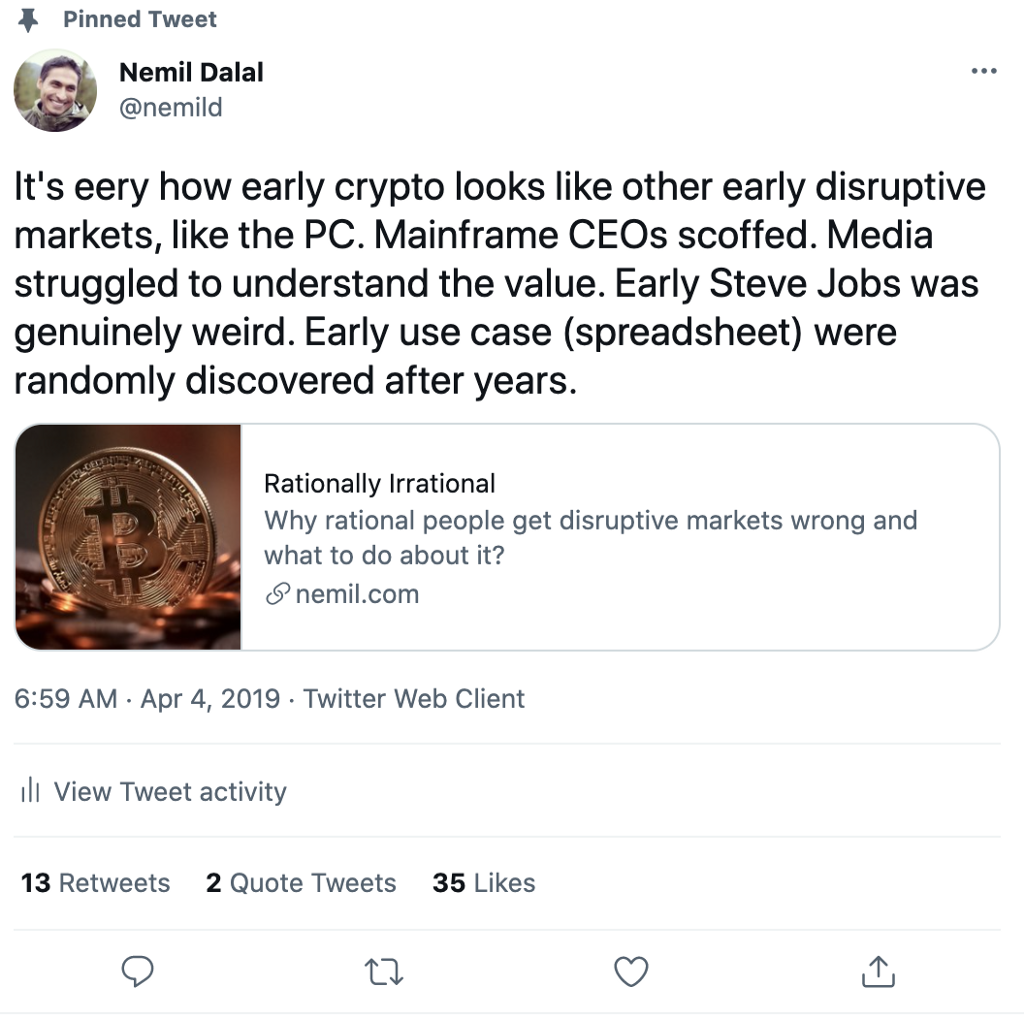
Soon after college, I consulted for one of the world’s top banks. What I saw horrified me.
Despite their dominance, their tech systems were a mess of spaghetti built over 40 years, with much of the code still running on proprietary COBOL mainframes when the world had long ago moved onto mobile phones, open APIs, and easier to use programming languages. It was clear to me that tech innovation would not come from our existing financial system.
Two years later, I was in India exploring how to extend microcredit using mobile payments. Few of the poorest had access to financial services that many of us are used to. It was clear to me that it would be transformational if we could make financial services more accessible.
Then one day in 2012, I met the founders of a tiny startup called Coinbase and read the Bitcoin whitepaper. While I didn’t know how crypto would grow, I also knew that the world would never be the same again: suddenly, we had an open, worldwide protocol that anyone could access and that any developer could build on top of.
My first major love in crypto was smart contracts: tiny pieces of code that let us program money.
function deposit() public payable returns (uint) {
require((balances[msg.sender] + msg.value) >= balances[msg.sender]);
balances[msg.sender] += msg.value;
emit LogDepositMade(msg.sender, msg.value);
return balances[msg.sender];
}
[A deposit function in a smart contract “bank” circa 2016]
With this code, a programmer could define a safe deposit box or an entirely digital bank that anyone in the world can access and where your money was kept secure. I started writing my own smart contracts, audited those of some leading teams, and then launched a decentralized finance protocol.
Eventually, Coinbase acquired my company and asked me to first lead USDC, now a $25 BN US dollar backed stablecoin. Today, I lead Product for their Crypto team, the team that connects Coinbase to the blockchain, manages billions of dollars, and brainstorms foundational innovations.
Our team is composed of brilliant cryptographers, engineers, product managers, user researchers, and data scientists who get to dream up the future.
How is crypto different from other parts of tech?
On the face of it, crypto is just like every other part of tech: fast moving, world impacting, growing quickly. In reality, there are three things that distinguish it:
The Revolution will be Decentralized Unlike other industries, innovation isn’t led by the same cast of big tech companies in a top down way. In fact, many of the most exciting innovations come from companies like Coinbase down to garage size startups.
In fact, many of the leading companies in the world are woefully underinvested and underprepared for the world of blockchains. It’s a space where small groups of people can make a dramatic impact. And you don’t need to be in a handful of tech-forward companies based in Silicon Valley; you can contribute from anywhere in the world.
Crypto innovations are more democratic and grassroots than most other industries.
Frenetic and “Stagnant” Nearly every part of tech likes to brag how fast moving it is. But crypto is a world to itself.
One day, the blockchain is invented. The next day, smart contracts let us build decentralized finance. Stablecoins take off. Digital Art NFTs, some of which are created by rappers and celebrity artists, are suddenly worth millions of dollars and sold through Sotheby’s.
Crypto isn’t for the faint of heart. You’ll need to be constantly learning. If you’re on top now, it can be one innovation away from crashing down on you.
In crypto, we have years of “stagnation” and then dizzying price increases in frenetic bull markets. These bull markets are powerful ways to get tens of millions of people into crypto, but the winters are when so much innovation actually happens.
Ultimately, today’s crypto is a remarkable opportunity to get the best education of your life, every day.
Misfits In the early years, crypto was composed of misfits: people exploring the death of the nation state, goldbugs, anarchists. The more rational you were, the less likely you would have been able to see the potential. Even though crypto has gone mainstream, it still values this founding ethos.

Source: https://twitter.com/nemild/status/1113803344827441153?s=20
Namely, being a misfit or an outsider can give you unique perspectives. After all, challenging a financial system built over millennia requires out of the box thinking and a willingness to challenge long standing assumptions.
What misconceptions are there about getting into crypto?
Crypto is more than payments To the external observer, the most obvious use case for crypto seems to be payments. International remittances are huge, funds can take days to arrive, and fees are far from 0.
In reality, crypto is the technology for financial expression that will underpin every asset we have. It can improve payments, but it will transform other industries from lending to trading to money.
In short, we’re building an internet of finance. Rather than payments or a replacement for money, crypto is the rails on which every financial product we have will eventually live.
It’s Never Too Late First, it’s never too late. When I first started playing in crypto in 2014, I was pretty sure it was too late. The price of Bitcoin had skyrocketed and all the exciting things seemed to be done. Little did I know.
Even today, the vast majority of the world doesn’t use crypto. We have much to do if we want to make crypto accessible, usable, and safe for everyone. Crypto is at a unique moment where small groups of people can do world-changing work.
Passion and learning required, not engineering experience Second, you don’t need to be a crypto expert to enable the crypto revolution. The most experience anyone has in crypto is one decade, and even in that time, the space has changed dramatically enough that the lessons of even a year ago no longer apply. Unlike other spaces, the “experts” in crypto aren’t that far apart from someone just joining.
You don’t need to be an engineer or techy to have an impact. The internet needed software engineers, designers, hardware engineers, telecom experts, policy makers, and entrepreneurs. Similarly, crypto needs a wide tent of smart contract engineers, web engineers, design, user research, compliance, legal, economists, financial experts, cryptographers, and more. Crypto will not grow without a wide tent of disciplines and diverse perspectives that communes and dreams together.
What is critical is a passion for what crypto can enable — a worldwide, open financial system — and a desire to constantly be learning. Without it, you can’t keep up with the dramatic daily innovation and stay motivated through the inevitable down cycles.
In crypto, we have a saying: to the moon. It’ll take a village to get there.
was originally published in The Coinbase Blog on Medium, where people are continuing the conversation by highlighting and responding to this story.

